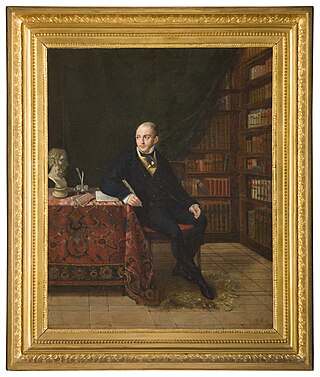
Jean Baptiste Smits (Antwerp, April 10, 1792 - Arlon, May 3, 1857) was a Belgian Member of Parliament and minister. [1] [2] [3]

Jean Baptiste Smits (Antwerp, April 10, 1792 - Arlon, May 3, 1857) was a Belgian Member of Parliament and minister. [1] [2] [3]
Smits was a son of Henri-Joseph Smits and Isabelle Verrept. He was married twice. He had four sons with his first wife. He began his career as a clerk at the Commercial Court (1806-1808). He was:
He also had a political career. In 1833 he was elected unionist representative for the Antwerp district and held this office until 1845. From August 1841 until April 1843 he was Minister of Finance.
He became Provincial Governor of Luxembourg in 1843 and held this office until his death.

The 1830s was a decade of the Gregorian calendar that began on January 1, 1830, and ended on December 31, 1839.

The Prix de Rome or Grand Prix de Rome was a French scholarship for arts students, initially for painters and sculptors, that was established in 1663 during the reign of Louis XIV of France. Winners were awarded a bursary that allowed them to stay in Rome for three to five years at the expense of the state. The prize was extended to architecture in 1720, music in 1803 and engraving in 1804. The prestigious award was abolished in 1968 by André Malraux, then Minister of Culture, following the May 68 riots that called for cultural change.

Sir George Hayter was an English painter, specialising in portraits and large works involving sometimes several hundred individual portraits. Queen Victoria appreciated his merits and appointed Hayter her Principal Painter in Ordinary and also awarded him a Knighthood in 1841.

Jan Frans Willems was a Flemish writer, and the father of the Flemish movement.

Jean Louis Joseph Lebeau was a Belgian liberal statesman, the prime minister of Belgium on two occasions.

Guillaume-Hippolyte Van Volxem was a Belgian lawyer, liberal politician and mayor of the City of Brussels.
Jean–François Tielemans was a Belgian lawyer and liberal politician. He was interim governor of the province of Antwerp from 7 April 1831 until 14 June 1831 and governor of Liège Province from 4 June 1831 until 4 October 1832.

Louis de Potter, was a Belgian journalist, revolutionary, politician and writer. Out of the more than 100 books and pamphlets, one of the most notable works was his famous Letter to my Fellow Citizens in which he promoted democracy, universal electoral rights and the unity among Belgian liberals and Catholics. As one of the heroes of the Belgian Revolution, he proclaimed the independence of Belgium from the Netherlands, and inaugurated the first Belgian parliamentary assembly, on behalf of the outgoing Belgian provisional government.

Antoine Virgile Schneider was a French general and politician. He was Minister of War under the July Monarchy in the second government of Jean de Dieu Soult from 12 May 1839 to 1 March 1840.
Auguste Philippe de Peellaert was a Belgian officer who, after his military career, became a painter, composer, and writer.

Édouard Joseph Mercier was a Belgian politician of liberal tendencies. He is the uncle of Cardinal Mercier. He served several terms as Minister of Finance; first was 1840–1841, second was 1843–1845; Third term was 1855–1857. He was appointed Minister of State in 1845.
Laurent François Félix Veydt was a liberal Belgian Member of Parliament and a Minister.

Léandre Joseph Antoine Desmaisières was a Belgian politician.

Camille de Briey was a Belgian industrialist, politician and diplomat.

Charles Joseph Marie d'Hane Steenhuyse was a Belgian politician. He was a landowner and rentier, liberal Schepen in Ghent and a Catholic MP.
Jean-Baptiste de Bouge (1757–1833) was a Belgian cartographer whose career spanned decades of major political upheaval, his country in turn being the Austrian Netherlands, the United Belgian States, the French First Republic, the Napoleonic Empire, and the United Kingdom of the Netherlands, before becoming the Kingdom of Belgium. He often worked with the cartographic engraver Philippe Joseph Maillart.